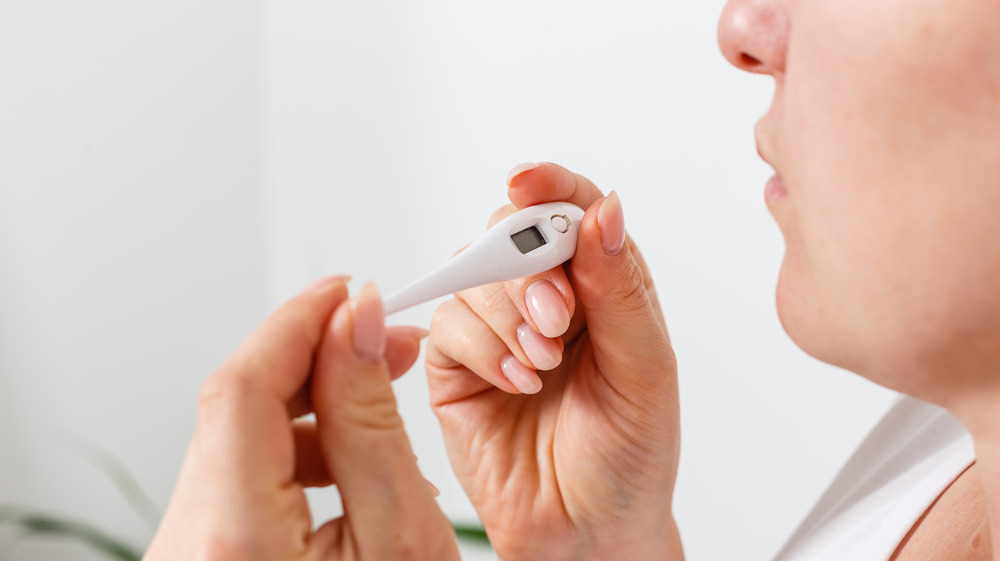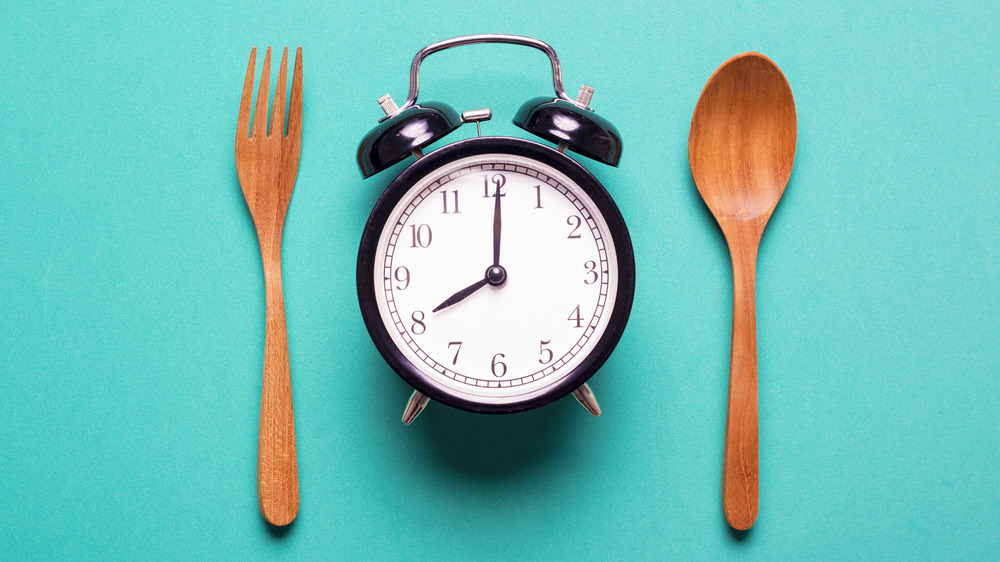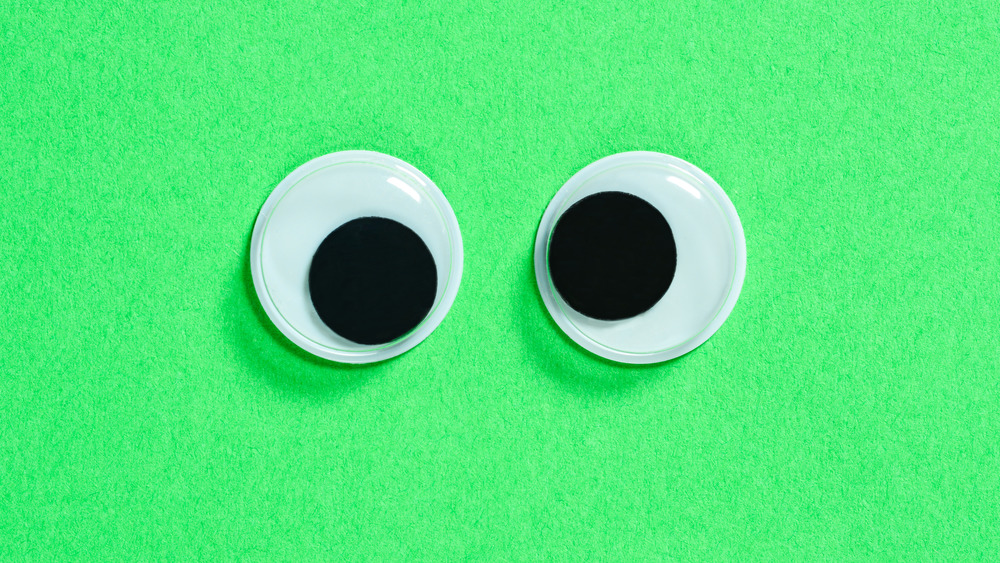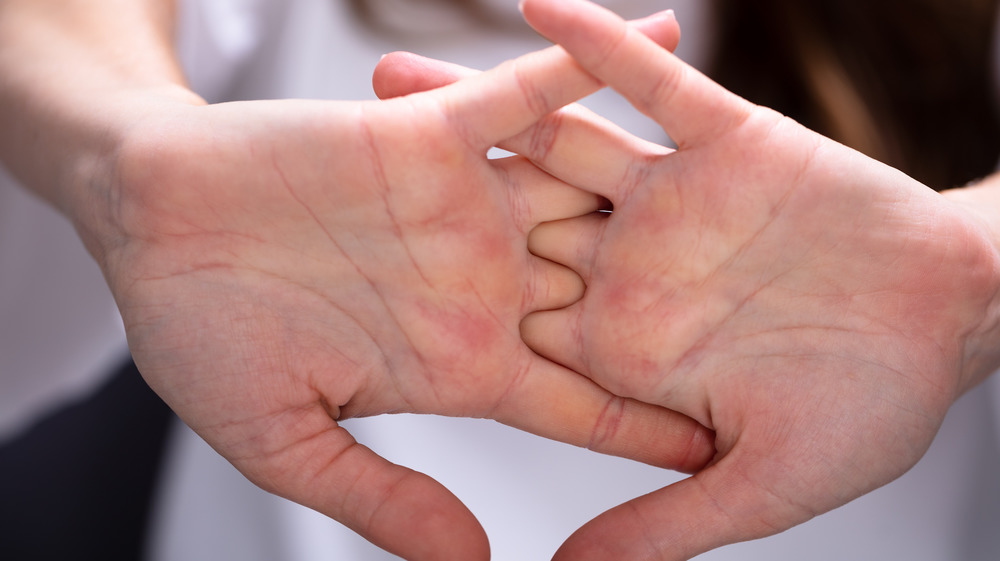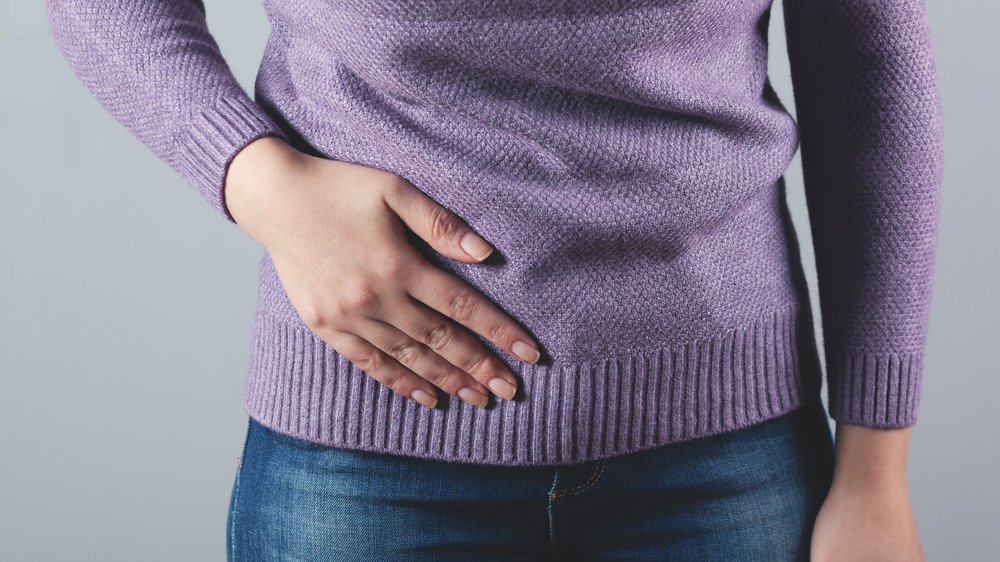Things You Believe About Your Body That Are Completely False
False beliefs about the human body and health are nothing new. In previous centuries, people believed that health was related to the four elements of air, earth, fire and water. It was accepted that surgery should be scheduled according to the position of the moon, and that bloodletting was a fine way to treat an illness (via British Library). According to History, the ancient Greeks were convinced that the uterus was a kind of "living animal" inside a woman's body, and could move around and cause illness.
It's easy to chuckle over such benighted beliefs, but how confident are you in your own knowledge? Although we've come along way in our comprehension of how the human body works, there's still things you may be confused about. Do you know what your appendix is for, or what percentage of your brain you're using right now? Are you sure you're drinking enough water every day?
Read on to find out the truth about common misconceptions regarding your body, because understanding the workings of your own body isn't just a matter of gaining abstract knowledge. According to the Center for Health Care Statistics, people without basic health literacy have four times higher health care costs.
False: You need to drink eight glasses of water every day
Don't get us wrong, water is important for your body. In fact, the adult body is about 60 percent water. Your brain and heart are 73 percent water, your muscles are 79 percent water, and even your bones are 31 percent water, according to the U.S. Geological Service. We're constantly losing water in our sweat, breath, and bathroom visits, so we need to replenish that missing moisture. But the "eight glasses a day" rule is more like a guideline than a maxim, per the Mayo Clinic.
Everyone's needs are different, and on any given day you may need more or less water than usual because of exercise or weather conditions. Most people will get the hydration they need if they drink when they're thirsty. If you really need a rule to follow, eight glasses of water daily isn't a bad idea. Or, you can try to drink a glass with every meal, one between meals, and before, during, and after exercise. Just know there's no need to force down all eight glasses if you're not feeling it. And remember that you'll get some water with your food, especially fruit and vegetables.
False: Normal body temperature is 98.6 degrees
You may not want to tell your mother — considering all those times she checked your temperature to see if you needed to stay home from school — but 98.6 degrees Fahrenheit is not the normal temperature of the human body! In fact, there may not even be one body temperature to rule them all since our temp varies throughout the day, getting higher as the day progresses. Also, older people tend to have lower temps than younger people, and women tend to have higher body temperatures than men (via Harvard Health Blog).
As the university blog highlighted, a more accurate average temperature is probably something like 97.5 Fahrenheit, as indicated by an analysis in the Scandinavian Journal of Caring Sciences. If that rocks your thermometer, brace yourself: A Stanford University research article suggests that the average human body temperature has actually been falling over the last 200 years or so. Comparisons of measurements taken in the mid 1880s (when "98.6" became the standard) with more recent data shows we've lost more than a full degree. A lower metabolic rate and lower rates of illness and inflammation may be responsible for humans running slightly cooler in modern times.
False: You need eight hours of sleep every night
When you were a kid, all you wanted was to stay up as late as possible. Now that you're an adult, there are times when you'd give anything for some extra shuteye. But how much do you need? You've probably heard that you need eight hours; however, according to the 2015 consensus published the journal, Sleep, the American Academy of Sleep Medicine (AASM) recommends adults aged 18 to 60 get a minimum of seven hours of sleep nightly. And this remains the recommendation, as of this writing.
Continually getting less than seven hours per night has been linked with health problems of all sorts, from obesity and heart disease to depression and an impaired immune system. It also raises the risk of serious accidents during the day, per the consensus.
Can't seem to get the sleep you need? You may be among the 30 to 35 percent of adults who have insomnia, especially if you take more than 30 minutes to fall asleep, or wake up in the night and can't doze off again (via AASM). Better bedtime habits – like going to bed at the same time every night, keeping the bedroom dark and quiet, and avoiding screens in bed — can help you book a ticket to dreamland.
False: You need three meals a day
If there's brunch between breakfast and lunch, how come there's no linner between breakfast and dinner? Maybe there should be. The "three square meals a day" model of eating isn't as fundamental as it's cracked up to be. For one thing, it's a relatively recent concept, dating back to the Industrial Revolution, according to Abigail Carroll in her book Three Squares: The Invention of the American Meal (via Newcity).
In terms of healthy eating, how you eat seems to be more important than how often you eat. Eating frequent, small meals throughout the day can make it easier to keep to a healthy calorie level because you'll avoid the intense hunger that can come from waiting for the next meal to eat something, per the American Heart Association. That said, switching from three squares to near-constant nibbling isn't a magic ticket to a healthier diet, reported the American Society for Nutrition, especially since the practice lends itself to depending on unhealthy snacks.
False: Low-fat food will help you lose weight
In the 1980s and 90s, dietary fat was public health enemy number one, with scientists, government health agencies, and the popular press all pointing to a low-fat diet as the path to weight loss and "heart health." It's since become clear that the truth is more complicated, according to an academic study in Journal of the History of Medicine and Allied Sciences — especially since obesity rates rose even as low-fat food products filled the grocery stores.
Cutting fats out of your diet usually means replacing them with sugar and other simple carbohydrates, undercutting any health benefits. Modern thinking, according to the National Institutes of Health, recommends limiting one's intake of animal fats, aka saturated fats, which increase heart disease risk, and replacing them with the healthier fats found in fish, olive oil, nuts, and other plant sources. For weight loss, studies show that cutting calories is the way to go, and that our "dietary patterns" should be addressed in any weight loss plan rather than focusing on a single nutrient like fat.
False: Being in cold weather will give you a cold
We stay away from sneezing people, we get flu shots, we slather on the hand sanitizer because we know that the common cold is caused by germs — or specifically, a virus. And yet we all catch ourselves saying, or thinking, things like, "You'll catch a cold if you go outside without a coat" or "I hope this weather doesn't make me sick." Plus, the term "cold and flu season" exists for a reason. We get far fewer illnesses in the warmer months.
So what's the deal? Well, cold weather won't cause a cold, but it does make it easier for those germs to do their thing, reported CNN. Cold, dry air makes the microbes more infectious, and allows them to replicate faster. Our immune system isn't as good at handling cold air, and a lack of sunlight and exercise in winter months also weakens our immunity. Add in all the time we spend indoors, close to other people who may be infected, and you've got a formula for using up all your sick days before spring.
False: If you cross your eyes, they may stay that way
Did you know that each of your eyeballs has six muscles responsible for movement? They must all work together for your eyes to line up, so your brain can make a 3-D image of what you see. If one or more of the muscles is stiff or weak, the eyes don't point in the same direction. The result is "strabismus," the medical term for crossed eyes, according to the American Academy of Ophthalmology (AAO).
When strabismus occurs in a young child, the brain learns to ignore one of the two misaligned images, so effectively the child sees only through one eye and has no depth perception. Strabismus can also develop in adulthood, causing symptoms like double or blurred vision, weakness in the affected eye, and problems reading or seeing clearly. Additionally, strabismus can be the result of a head injury or other accident, a stroke, or certain chronic health problems like diabetes or thyroid disease.
However, this condition is certainly not caused by crossing your eyes. After all, your eye muscles never get "stuck" when you look around, do they? They won't get stuck if you cross your eyes, either (via AAO).
False: Cracking your knuckles is bad for your fingers
Frequently cracking your knuckles may be bad for your relationships with friends, roommates, a significant other, or anyone else in your life who's annoyed by the incessant snap-crackle-pop SFX you're making. But as a far as doing any serious damage to your finger joints, there's not much risk, according to a scientific review in The Journal of the American Board of Family Medicine.
The notion that knuckle-cracking might cause arthritis or other joint damage isn't an unreasonable supposition. The force it takes to crack a knuckle has been found to exceed the amount needed to damage the tissue of the joint, according to the study. But comparisons among people with and without arthritis of the hand have found no connection to knuckle-cracking, which is equally common in both groups.
So what's with that cracking sound? It's related to bubbles that form within the fluid inside the joint as the knuckle bones are separated. But scientists disagree on whether it's the formation of the bubbles, or their collapse, that makes the noise (via The Guardian).
False: Most people only use 10 percent of their brain
Sure, it's tempting to think that some people you run into aren't using their heads. But if you apply your own brain to the problem, you're realize the idea that the human brain is always 90 percent inoperative doesn't make a whole lot of sense.
For one thing, as psychology professor and researcher Kevin Bennet revealed in an article for Psychology Today, this implies that a person could lose almost all of their brain tissue and function just fine. "You have never heard of anyone with [90 percent of their] brain missing, because pretty much all areas of the brain are capable of electrical and chemical activity," Bennet wrote.
Also, why would our species have evolved such big heads if we didn't need the real estate? At the very least, if most of our brain doesn't need to be there, we're spending way too much on hats. The idea that we have an untapped reserve of psychic power waiting to be unlocked is a compelling one, and it dates at least as far back as the 1920s. But if you want to see what a 100 percent brain power looks like in action, well, just take a look in the mirror.
False: Spicy food will give you ulcers
A stomach, or peptic, ulcer is a sore in the lining of your stomach, exposing it to stomach acid and causing a dull or burning pain when your stomach's empty. The pain can last for minutes or hours, according to the National Institute of Diabetes and Digestive and Kidney Diseases (NIDDK). It seems logical that hot, spicy food might damage your stomach, but ulcer pain is caused by your own stomach acid not by the food you eat.
According to the NIDDK, no link has been found between stomach ulcers and diet. The main cause of peptic ulcers is a bacteria called H. pylori, according to Medline Plus, which infects about 30 to 40 percent of the U.S. population, and in some people damages the stomach lining. Ulcers can also be caused by long-term use of nonsteroidal anti-inflammatory drugs (NSAIDs), such as ibuprofen and aspirin. These drugs can block the enzymes that protect your stomach from stomach acids.
Not only do spicy foods not cause ulcers, some of them may actually be helpful. A review in Critical Reviews in Food Science and Nutrition found that a chemical called capsaicin, found in chili peppers, inhibits the release of stomach acid and stimulates secretions that promote the healing of ulcers.
False: You don't need sunscreen if you have dark skin
The ultraviolet rays from sunlight can damage any type of skin. Even in people with dark skin or people who rarely burn, the sun's UV rays can cause skin cancer (via Skin Cancer Foundation). However, it is true that darker skin offers more protection from sun damage because of the higher content of the pigment melanin, per Medical News Today. But the protection has its limits.
According to Health, the misconception that people with dark skin can't get skin cancer is a dangerous one as it can lead to ignoring sun protection, like sunscreen and dermatological screenings. This can lead to worse melanoma survival rates. Bottom line: Everyone should protect their skin from the sun, using sunscreen, clothing, and shade.
The Skin Care Foundation recommends doing a monthly head-to-toe exam and seeing a doctor to check anything new, changing, or unusual regarding the skin. Note: "Melanoma in people of color most often occurs on areas that get little sun exposure, with up to 60 to 75 percent of tumors arising on the palms of the hands, soles of the feet and the nail areas" (via Skin Care Foundation).
False: Your appendix is useless
You probably have some vague idea of where your appendix is, but let's lock that down: It's a small, oblong pouch that hangs from your colon, located in the lower-right side of the your abdomen. It can become blocked and infected with bacteria, causing swelling, inflammation, and pain. This is called appendicitis, and if left untreated an inflamed appendix could rupture — a life-threatening situation, according to the Mayo Clinic.
Other than cause drama, the human appendix may not seem like it does much. As such, scientists have considered it to be a vestigial organ, one that helped our pre-human ancestors to digest plant material, but lost that function as our diet changed. That is to say, it's a body part humans don't need anymore. However, the reputation of this humble little organ is changing.
In a 2016 review published in Clinical and Experimental Immunology, experts revealed that the appendix seems to be a useful part of our immune system. Not only does it contain a high number of immune cells, it may be a sort of "safe house" for beneficial bacteria that help our digestive system function. When illness depletes our levels of those helpful microbes, the appendix repopulates them.
False: Men have a higher sex drive than women
It's not just sitcoms and sex comedies that paint a picture of sexual desire being a guy thing. Research has long supported the idea that the male sex drive is stronger than the female sex drive, as a Current Sexual Health Reports article highlighted. However, more recent research suggests that things aren't so simple.
The aforementioned article suggested that if sexual desire is defined as a state of being that we go in and out of rather than a personality trait that's stable over time, the sex drive difference disappears. For example, when men and women were shown a film with sexual content and questioned afterward, their self-reported level of arousal was the same.
In an interview with BBC Future, Lisa Diamond, professor of psychology and gender studies, explained, "During women's peak period of arousal, which occurs around ovulation, their sexual motivation is just as strong as men," So rather than saying women's sex drive is lower, it may be more accurate to say that women have a more "variable" sex drive compared to men.
False: Shoe size predicts penis size
You've no doubt heard the rhetorical question, "You know what they say about guys with big feet?" In a 2011 study published in International Journal of Impotence Research, researchers put to the test the familiar belief that the size of a man's member is related to the size of his feet (and other extremities) because, after all, "the penis appears in virtually every aspect of life." Okay, scientists, that's arguably one of our favorite lines of any research study published in any scientific journal ever...
Believe it or not, though, this subject had been studied before. However, previous research relied on self-reporting of penis length which, let's admit it, just isn't the best way to get an accurate assessment of that data. Later studies got up close and personal instead of relying on participants' reports and found, according to a 2020 analysis in the Journal of Sex and Marital Therapy, that "there is little to no evidence that penis length is correlated with shoe size." So, guys, you can stop buying shoes that are a size too big; the secret's out.



